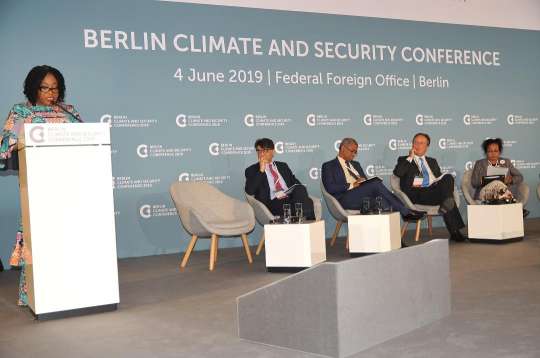 Ms Shirley Ayorkor Botchway, the Foreign Affairs Minister has called on global Foreign Ministers to use their influence in championing the climate change agenda, by leading global coalitions on ambitious climate change mitigation initiatives.
Ms Shirley Ayorkor Botchway, the Foreign Affairs Minister has called on global Foreign Ministers to use their influence in championing the climate change agenda, by leading global coalitions on ambitious climate change mitigation initiatives.
She said lessons could be learnt from the Group of Friends on Climate Change and Security in developing such a coalition.
She indicated that the Group of Friends on Climate Change seeks to develop solutions for the impact of climate change on security policy, raise public awareness and boost the involvement of the United Nations in this area.
Speaking at the just ended Climate and Security Conference held in Berlin, Germany on June 4, Ms Botchway said there was the need to take a closer look at the non-binding nature of international frameworks in addressing climate change and strengthen compliance mechanisms.
She said strong political leadership and strategic engagement was also required across the decision making spectrum at all levels in addressing climate change.
She emphasised the need to prioritize climate change issues in national, regional and continental foreign policy engagements, adding that, beyond the various initiatives to address climate change like Kyoto Protocol and the Paris Agreement on climate change, much more attention should be focused on enforcement of these protocols by States.
Ms Botchway welcomed the integration of climate-related risks discussions and operations around international security in the UN Security Council’s debates, as demonstrated by its debate on 25th February, 2019 on the topic “Addressing the impacts of climate-related Disasters on International Peace and Security”.
She stated that the UN Security Council should play a key role in addressing climate change by prioritizing it on its agenda and taking action through resolutions to address the climate security nexus.
She said the political will of members of the Security Council, including the P5, would be critical in addressing climate change globally.
According to the Minister, Foreign Ministries had previously been passive about climate change issues; however, in recent times, climate change and its related issues have been brought to the front burner by the Ministers in all major international fora.
She said Foreign Ministries now placed high priority on climate change in the formulation of their foreign policies and actively participated in negotiations on the same.
“They have also realized the cross-sectoral nature of climate change and so in their international engagements, they coordinate with other government offices such as the Ministry of the Environment, Finance, Trade and Industries, security agencies, private sector, civil society organisations, women and youth groups in an attempt to maximize a buy in from all stakeholders in addressing the issue. This approach should be enhanced and continued in the future”, she stated.
She mentioned that although countries in the global south contributed less to climate change, they were rather more vulnerable to the negative impact of global warming, and therefore, they expected the international community, especially the global north, “to walk the talk by implementing reductions in their carbon emissions in order to meet the set global standards”.
“The north is also expected to support climate resilient initiatives in the south, including the extension of financial support, which is needed in addressing the impacts of climate change. Political will and commitment of leaders in the global north and particularly among the P5 will go a long way in setting the global pace to addressing the issue, Ms Botchway said.
She commended Germany for its decision to use its role as a non-permanent member of the Security Council, to ensure that climate change concerns were an integral part of UN security policy, and also encouraged more of such proactive initiatives.
She recommended the need for the UN General Assembly, which is the most representative organ of the UN, as well as the Economic and Social Council of the UN, to have regular engagements with the Security Council on climate change.
“Consistent engagements with the Peace building Commission of the UN as well as with Troop and Police Contribution Countries (TPCC’s) to discuss the climate change security nexus would also help to win the support of the Security Council in addressing Climate change and its impacts on global peace and security.
Source: GNA























